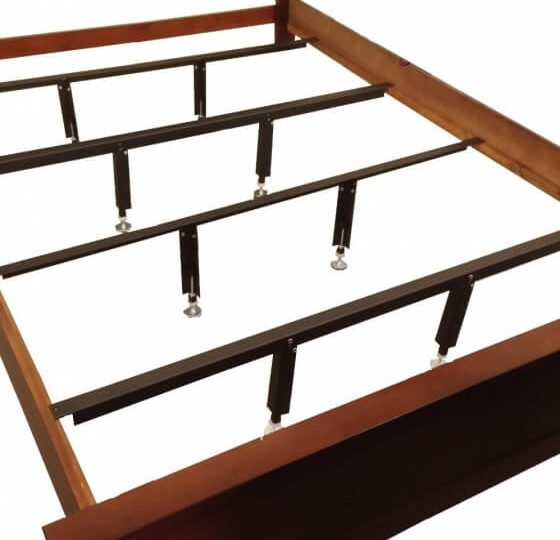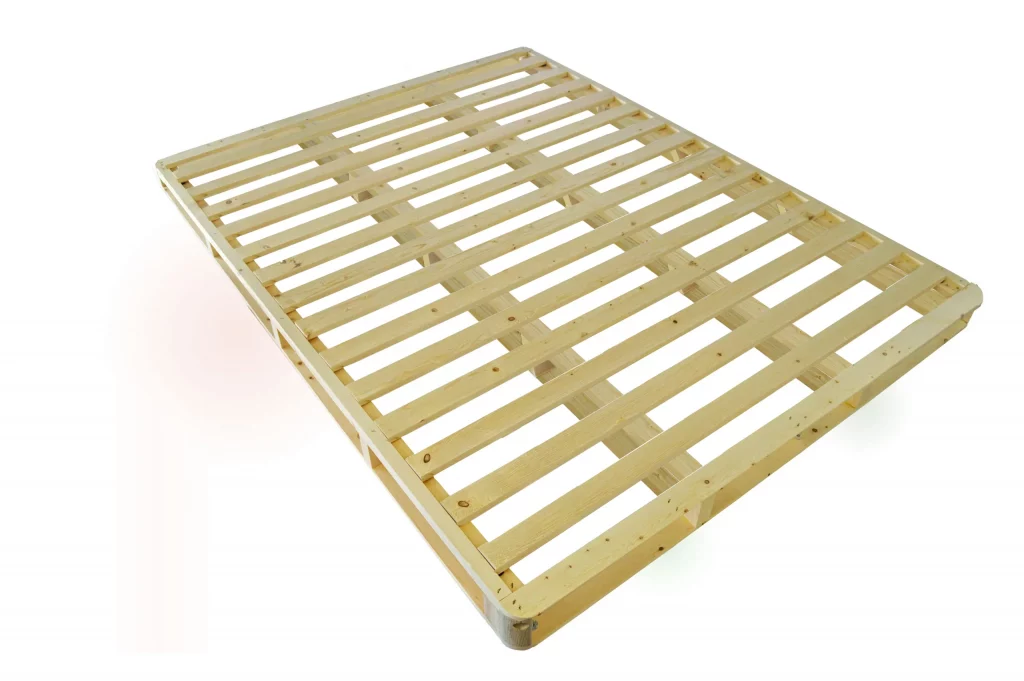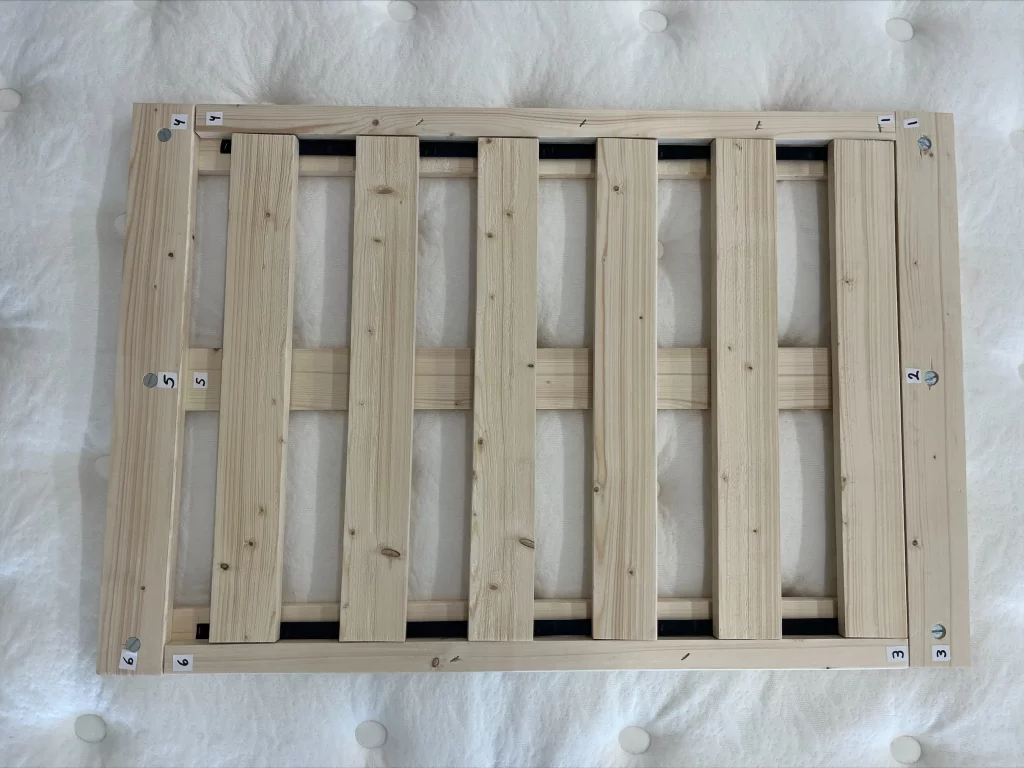Every purchase made online is encrypted with a high level of security you’ve come to expect. Your private information is never shared nor sold, so you can buy with confidence. You can also visit our store if you are in the St. Louis area.

Estimated reading time: 8 minutes
Table of Contents
Question: Is It Okay To Put A Mattress On A Bed Frame Without The Box Spring?
Without a doubt, this is the most common question we get asked. Can you place a mattress on an ordinary steel bed frame? Sure you can, but…would placing the mattress on a steel bed frame damage your mattress? Absolutely. We are going to share some common solutions to this question that will help answer this question and what you can do safely.
Check Out These Related Links
We are going to cover the various types of supports a mattress can have, and exactly how each type of support works.
Like all projects, there is a right and a wrong way, and we will talk about all of the ways to support your mattress and the pros and cons. The takeaway here needs to be that the way your mattress is being supported can cause the mattress to fail prematurely, or it can be the reason it lasts for 10-plus years. Let’s address the question. What do we mean when we say, “put a mattress on a bed frame?”
We are specifically referring to the steel underpinnings or angle iron framework of the bed. This steel framing directly supports a traditional box spring/foundation and elevates the bed by getting the mattress set up off the floor. It includes 2 steel angle iron side rails, and 1- 3 cross supports bars that run from side to side, depending on the size and quality of the bed frame. Some better models even include a spinal beam that runs the length of the frame down the middle for added support. Regardless of the frame, it will either include wheels or flat feet. NOTE: We are not defining the bed frame as your head and footboard.
Check Out These Answers About The Split Boxspring
What Are My Options
First, we need to understand that mattresses, box springs/foundations, and frames have very different jobs. The comfort portion of the bed is the mattress which sits directly on top of a foundation and we often refer to it as the boxspring. The boxspring then sits upon the bed frame. Of course, we lie on the mattress, and its flexibility, support, and comfort can come from several different inner working configurations all of which need specific unique support required by the manufacturer; coil springs, latex rubber, memory foam, or a hybrid of the aforementioned.
Mattresses typically have a firm core and malleable sleeping surface that easily molds, contours, and supports the unique curvatures of our bodies. Placing it on anything but a supportive flat surface can cause it to sway, sag or worse still fall between the steel supports.

Sitting A Mattress On A Metal Bed Frame
Different types of mattresses may require different support so check with your mattress builder for required specific needs. When you choose a traditional steel Hollywood-style frame or a bed frame that only has steel side rails, and steel slats spanning the width as mentioned above, this by itself is NOT enough support to place a mattress directly on the frame.
With that said we have witnessed people who choose to add numerous steel slats spacing them close together. We will mention that this is a costly solution that can also include unplanned customization. It is important to note that without closely spaced slats there wouldn’t be nearly enough even flat support for your mattress to rest upon and would droop, sway and sag between the slats.
Placing Mattress Wood Slats On A Metal Bed Frame
To place a mattress on numerous ¾-inch thick by 2-3 inch plank-type slats is one of the oldest ways to support a mattress set. Up until recently, slats were ONLY used to support the boxspring and then the mattress upon the boxspring. The narrow wood slats must be closely spaced with enough feet supporting the middle areas correctly.
A higher concentration of leg support is especially useful if they are placed directly under the 2 main sleeping areas. The specific spacing you can have between slats will depend on the warranty requirements of your mattress, but most good mattress producers recommend the spacing of the metal braces or wood laths to be no more than 2-3 inches apart.
Placing Mattress On Plywood On A Metal Bed Frame
While we do not install plywood ourselves, we have seen some dandy DYI versions customers have done on the cheap. They often do something like a thick solid plywood-type deck that is similar to that of the old-time hard-side waterbed floor or decking. They always used ¾ inch.
This can have drawbacks.
- Because there is no box spring it can sit extremely low.
- You do need to inspect your frame for sharp edges from the raw steel.
- Breathability could be an issue for some mattresses with those types of issues already like all foam mattresses.
What Kind Of Box Spring, Platform, Or Bunkie Board Can I Use With Steel Bed Frame?
Example Of A Frame That Must Have Boxsprings
This type of support system would require the use of a box spring, a platform, or a solid safe alternative:
Above are 2 common bed frames that may be very similar to what you currently own but can you place a mattress directly on them? No, not as they are shown. The important thing to notice is that all of these systems have center support bars or extra slats. While they are all strong and made of angle iron and steel, they all have one, two, and even as many as four slats spanning the bed’s width.

These are perfect examples of what a mattress by itself should NOT be placed upon. Our recommendation is a closely spaced slat pack with some strategically placed sturdy legs in the middle which would be a more viable solution to consider if you want to do away with a box spring or foundation.
Boxsprings and Foundations come in various heights. Below are a few options that could help with height issues. Meaning a person needs to either lower or raise the completed mattress height for better in and out access for the sleeper. Simply total the height of your bed frame, the boxspring, and the mattress. This will be the top of your mattress measurement.
Various Boxsprings And Foundations That Could Help With Height Issues
8.25 Inch Foundation
For a taller mattress set height of the bed frame, an 8.25” tall foundation, and mattress will usually be the best choice.
- Quick Assemble Heavy Duty High Profile Springless Boxspring – 8.25″
- Quick Assemble Heavy Duty Foundation Low Profile 5″ Springless Box Spring

5 Inch Foundation
For a slightly lower to average mattress set height of bed frame, a 5” tall foundation, and mattress will usually be the best choice.
- Quick Assemble Super Heavy Duty Foundation High Profile 8.25″ Springless Box Spring
- Super Heavy Duty Foundation Low Profile 5″ Springless Box Spring Quick Assemble

5 Inch Foundation Platform Foundation Or Bunkie Board
For a lower mattress set height of bed frame, a 2” Platform Foundation or Bunkie Board and mattress will usually be the best choice.

Do You Need A Bunkie Board
Check Out Our Extra Low Profile 2” Platform Foundation Or Bunkie Board
Order TodayOther Alternatives to Boxspring / Foundations
- Forever Foundation Super Heavy Duty. Built to last. Eliminates the need for a box spring or steel bed frame with storage space underneath.
- Space Saver Standard Duty and lower cost. Helps eliminate the need for a box spring or steel bed frame with storage space underneath.
There are some real issues with doing this; frankly, it can damage your mattress if it’s not placed on the box spring or foundation it was designed to work with. While box springs and foundations have different names, they are very similar to one another in what they actually do; they are both designed to be used as the base support that goes directly underneath a mattress while sitting on top of a bed frame.
It is simple, you can sleep on a mattress without a box spring comfortably and there are a few different ways to do it. These days a boxspring is nothing more than a rigid elevated riser referred to commonly as a foundation. Some have a little flexibility and these we call semi-flex boxsprings. The truth is most bases do not flex or give so they essentially add nothing to the comfort or support of a mattress.
Do Two Twin Mattresses Equal A Queen Size
Frankly, you can skip it if you want to, perhaps you would want to consider alternative base support like a platform, plywood, slats, or a divan bed. Most such beds are essentially wooden frames with slats. Some are very basic while others are more fashionable. The important thing is to be sure that you know the manufacturer’s specific warranty and support requirements and whether it allows for use of the mattress without a box spring and that it is very solid structurally and safe.
If you have further questions as to whether your frame will support a mattress, email us pictures showing the frame you are attempting to put your mattress on and we can try to give you our opinion of whether it will work or not. You can also reach out to us at the top of this page.
Contact STL Beds Now
You can also contact us by filling out the form below. Make sure to fill in as many fields as possible so we can respond to you with the most accurate information!
